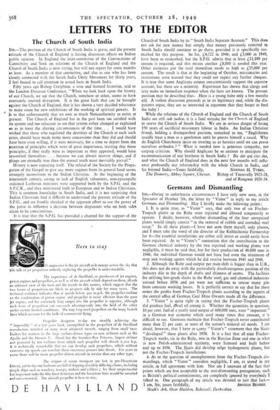LETTERS TO THE EDITOR
The Church of South India
sm,—Thc position of the Church of South India is grave, and the present attitude of the Church of England is having disastrous effects on Indian public opinion. In England the joint-committee of the Convocations of Canterbury and York on relations of the Church of England and the Church of South India is now sitting, but will not report for some months at least. As a member of that committee, and also as one who has been 'closely connected with the South India Unity Movement for thirty years, II feel bound to call attention to actual facts in South India.
Fifty years ago Bishop Creighton, a wise and learned historian, said to the London Diocesan Conference, " When we look back upon the history of our Church, we see that the Church, somehow or other, seems to have constantly courted disruption. It is the great fault that can be brought against the Church of England, that it has shown a very decided reluctance to make room for new exhibitions of the working of spiritual powers. It Is to that unfortunately that we owe so much Nonconformity as exists at present. The Church of England has in the past been too satisfied with its system and too reluctant to see that system either changed or explained so as to meet the altering circumstances of the time. . . I would have wished that those who regulated the destinies of the Church at each such crisis, should have made many more concessions than they did and should have been.even willing, if it were necessary, for a time to depart from the ',assertion of principles which were of great importance, trusting that those principles, if they really were as important as they appeared, would have reasserted themselves . . . because we can always recover things, and if things are eternally true then the eternal truth must inevitably prevail."
History is now repeating itself. The refusal of the Society for the Propa- gation of the Gospel to give any more support from its general fund seems strangely inconsistent to the Indian Christian. At the beginning of the nineteenth century, owing to lack of English volunteers, non-episcopally ordained Lutheran ministers were supported both by the S.P.G. and the S.P.C.K., and they ministered both to European and to Indian Christians. This is common knowledge in South India, and it is not surprising that Indian Christians find it difficult to understand the present attitude of the S.P.G., and are frankly shocked at the apparent effort to use the power of the purse to influence a decision between disputants who on both sides claim to be conscientious.
It is true that the S.P.G. has provided a channel for the support of the Church of South India by its " South India Separate Account." This does not ask for new money but simply that money previously remitted to South India should continue to go there, provided it is specifically ear- marked for this purpose. So far, £4,722 in 1948, and £3,000 in 1949, have been so earmarked, but the S.P.G. admits that at least £11,189 per annum is required, and this means another £8,000 is needed this year. Other estimates put the total immediate needs as high as £15,000 per annum. The result is that at the beginning of October, missionaries and institutions were warned that they could not expect any further cheques. It is true that some Anglicans cannot conscientiously support the separate account, but these are a minority. Experience has shown that clergy and laity make an immediate response when the facts arc known. The present position may be described thus. Here is a young babe only a few months old. A violent discussion proceeds as to its legitimacy and, while the dis- putants argue, they are so interested in argument that they forget to feed the baby !
While the relations of the Church of England and the Church of South India are still sub judice. it is a fatal mistake for the Church of England to starve the Church of South India. We are in serious danger of losing 150 years of sacrificial missionary labour in India. An Indian Christian friend, holding a distinguished position, remarked to me, "Englishmen usually treat a man as a gentleman until he proves himself a rascal. Why do English Churchmen insist on treating us as heretics until we can prove ourselves orthodox ? " What is needed now is generous sympathy, not carping criticism. Why should Anglicans be so anxious to anticipate the excommunication of our brethren in South India ? Bis dat qui cito dat, and what the Church of England does in the next few months will influ- ence profoundly our relationship with the whole Church in India, and and of Rangoon 1928-34.






































 Previous page
Previous page